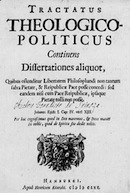
Source: Theologico-Political Treatise – Chapter IV. of the Divine Law
Spinoza's Chapter 4. – the 10 commandments were conceived as laws given by a law-giver deity not as eternal truths (Page 5)

Spinoza criticizes the Bible because it conceives of (Deus sive Natura) as a law-giver or potentate giving laws to men rather than the natural light of reason that is known by eternal truths.
For example, the fact that Scripture tells us that Adam was commanded not to eat of the tree of knowledge and that he did so shows that Scripture did not understand that the commands of (Deus sive Natura) always involve necessity and truth and cannot be disobeyed. Spinoza says that Adam disobeyed the command not eat of the tree because he understood it as a law or ordinance not as an eternal and necessary truth.
Further, the ancient Hebrews did not understand (Deus sive Natura) and thought of the 10 commandments as laws handed down by a potentate. They were led to the wrong idea by conceiving (Deus sive Natura) as a deity with a physical presence, a supreme law-giver who demanded worship.